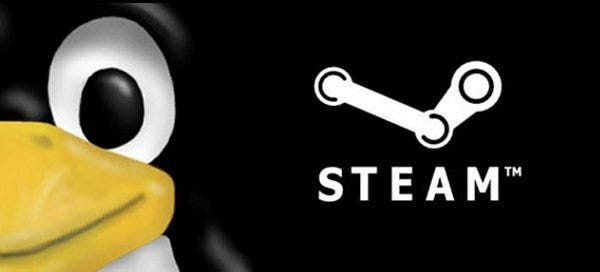Here's A Thought: What If Valve Were Making SteamOS?
Not So Steamy Windows
Things are moving apace at Valve. With the announcement of their first internal non-gaming project coming tonight (although it might be a documentary film), and the news that Steam will soon start selling software alongside games, you get the impression that they're attempting a significant repositioning. So, based entirely in speculation, here's what I'm wondering: Could this eventually lead to the release of SteamOS?
There are a three good reasons to see things heading this way.
And it begins with Gabe's very deliberate public discrediting of Windows 8. Now, he's not exactly being a maverick with such an opinion - Windows 8 is looking likely to be awful for desktop PCs, forcing a tablet interface onto a system that doesn't want or need it in any way. Worse, it's seen by some as an attempt to close down the openness of the PC, with games bought through the operating system. (If the EU fined them billions for forcing their own web browser on customers, I'm bemused at their thinking it will be okay to force their own online store.) None of it bodes well, and it's hard to imagine why any PC gamer would opt to upgrade from the pretty functional Windows 7.
But despite all this, you can also see how it could be to Valve's advantage to position themselves in an anti-Windows 8 stance if they were creating an alternative.
Then there's the recent announcement that Steam will soon sell non-gaming software. That makes a lot of sense however you approach it. If you want a copy of Photoshop, and you've paid the insane home-user price for it, you want it to stay up to date without that being a battle, and ideally without it constantly trying to sell you a new version of itself. Something like Steam could actively encourage software producers to stop being such epic arseholes, and provide a decent level of after-sales support for their products. Or, it might not. But it's a nice thought. Either way, it makes sense to me to be able to browse through a few different video editing tools from rival manufacturers all in one place, and then download the one I'm after on the spot.
Clearly that comes with issues too. Steam certainly can't be left in the state it's in, with its offline mode only functioning if you turn it on while there's a connection. If it's going to be the place where our work-based essentials are also bought, there's no room for nonsense. I cannot have Word refuse to run because my ISP is having a wobble.
There's also the inherent DRM that Steam is (as opposed to offers). If I purchase a copy of a piece of software, I might not want to obey the utterly pernicious EULAs that say I'm not allowed to install it on my wife's computer too. I have principles. With Steam, that choice is taken away from me, as it is with games. That's a fairly serious inhibition we've already sucked down for gaming, and it doesn't seem a great idea to accept it elsewhere. On the other hand, of course, it will ask some interesting questions of how software providers will fight their equally spiteful limitations of how many of your own machines on which you can install it. If it's your login, it's yours to install, surely?
And this takes us back to a SteamOS. If this is a piece of software that allows us to buy and install both games and software, and then run them from within... it's getting close, right. Clearly right now Steam does that through Windows' architecture. It's not exactly a small matter to become the foundations, rather than sit on them. But with Valve's final recent move, that also becomes an awful lot easier too.
The last big repositioning of late is the embracing of GNU/Linux. With the discovery that Steam will soon be released for yak and penguin lovers, it's going to be a seismic change in how the open source OS is recognised by gamers, and indeed how games will be recognised by the users of the open source OS. Valve have already reported real success with getting their games running on Linux, finding it more efficient for gaming than Windows. That's a big deal. And with the Humble Bundles and their copycats also pushing hard for Linux releases, there's clearly a big movement about to happen.
That's going to be interesting for the world of GNU/Linux. A large but extremely difficult to enter community that seems to be entirely constructed peculiar contrasts. Everybody's in-fighting, arguing about everything, from distros, to licenses, to even what to call the bloody operating system - most people involved would be prepared to go to war over which text editor is better. But they exist within a global community of sharing, where free-as-in-speech is at the very core - code is free, and any who try to change that unite them against a common enemy. They are so often driven by passion, and that's probably at the core of both aspects.
The one thing the GNU/Linux community is perhaps worst at - and mostly because they'll be furious and aghast at my saying it - is welcoming in new people. So in-depth is the language and the culture, that anyone who's ever tried to follow a step-by-step guide for anything will know it's often impossible. So much is assumed, leaving you in a bottomless fractal of user-guides, as you start another to find out what "go to root" in this one actually means, before realising that one is talking about "grepping", and as you're looking that up you're asked to "apt-get" a piece of software, the guide for which informs you that you must be logged in as root. And unfortunately, because one's ignorance of such basic fundamentals is born of having spent your life in the closed-source evil arms of Windows, attempts to untangle it further often result in contempt. It's messy.
The possibility of the arrival of a bunch of gamers, perhaps looking to escape the desktop horror of Win8, will likely be a mixed blessing. GNU's creator and shaman, Richard Stallman, has already described his conflicting feelings about the move. That's likely to echo throughout.
But what has this to do with a Steam-based operating system? Well, one of the most crucial aspects of a Linux-based operating system is that they're Free. The source code is open and available to anyone, and comes with a licence that ensures that anyone can come along, take it, change a line or two here and there, and then call it their own. So long as they offer the same rights with their creation, they're free to use it as they wish. So if Valve were interested in an operating system, but not in going through the 30 or so years it takes to get something refined enough for today's machines, there's one waiting for them right there. A copy of Ubuntu, a few key changes to hardwire Steam into it, a new loading logo and desktop background, and they've got themselves SteamOS. It's not that enormous a deal.
Of course, that comes with some issues. Not least the one Stallman raises, about Steam's not being free software. Valve are going to hit that hurdle hard once the Linux version launches, because people are going to bristle and start asking questions. Of course various aspects of GNU/Linux are already massively infiltrated by closed-source software, with some distros containing it in their code. Again, the in-fighting. Were they to hardwire Steam into, say, a version of Ubuntu, they'd likely catch some flak for making something closed-source integral to an operating system.
However, that wouldn't violate the rules of the GPL (GNU Public License) which is designed to ensure the rights of the code are passed on. So long as Valve kept every other aspect of the code free, and indeed didn't use any GPL-licensed code within that version of Steam, they would be perfectly within their rights to do so.
And while that may annoy some, there are ways they could actually win favour with others. Right now a real issue for the Linux community is Nvidia (amongst many others, obviously), whom the usually calm and gentle Linus Torvalds (creator of the Linux kernel) recently addressed with a raised middle finger and the declaration "FUCK YOU!". They are, according to Torvalds, enormously uncooperative, and that of course is problematic when it comes to getting drivers working with Linux games. A force like Valve coming into that world could carry with it a lot of weight in finally seeing some movement there, because Valve would want stuff to just work, and drivers have to be good enough if that's going to happen. Do that, and they could win a lot of fans.
Of course, this is all nothing but speculation. I'm triangulating a possible destination based on three rather loose references. It might be pure fantasy. But you've got to assume they've at least considered it. (Or maybe I'm inadvertently convincing them.)
And it doesn't have to be a big deal for the home user, either. It doesn't have to be a case of swapping Windows for SteamOS, or MacOS or Ubuntu or whatever for SteamOS. Just as with most Linux distros, it could be installed on a USB stick, stuck in your PC, laptop or netbook, and become a boot option when you switch on, the games themselves stored on another hard drive.
In the end, it's something that just kind of makes sense. But it would be a massive move. It would be one particular developer/publisher saying, "We're directly competing with you, Microsoft," and lead to all manner of interesting turf battles. It could bring forth enormous issues of competition rules, with companies like GamersGate, Desura, GOG and so on going completely loony. Who knows! Certainly not me. I'm just some guy.













